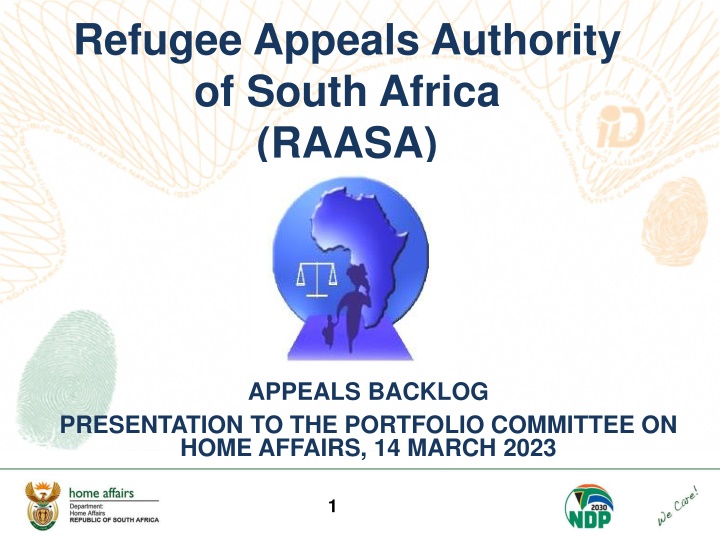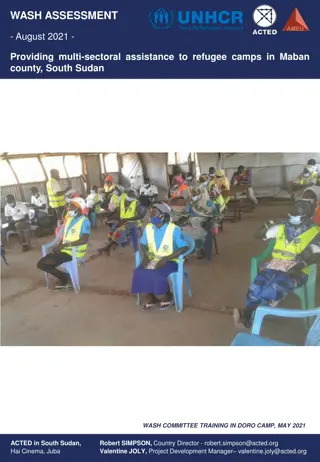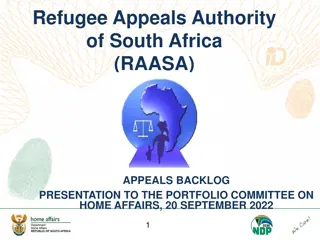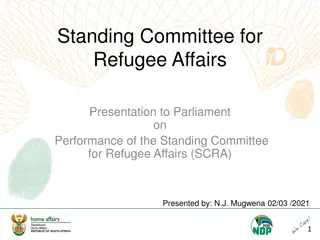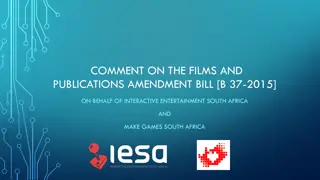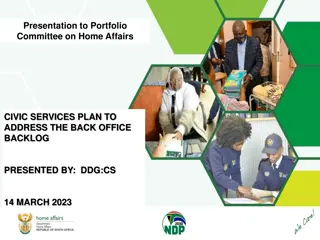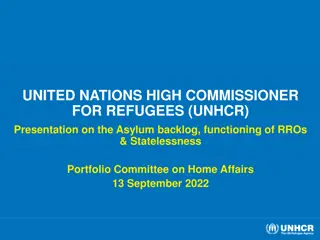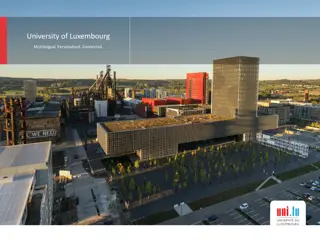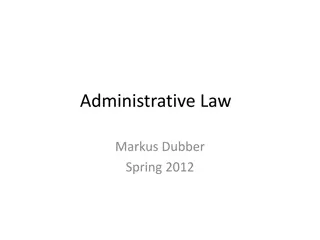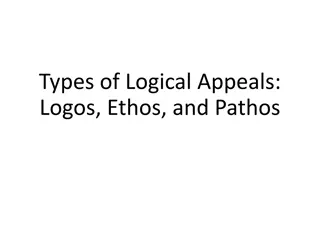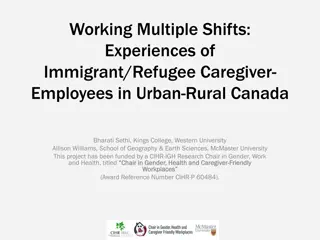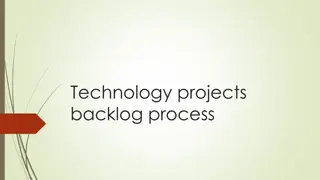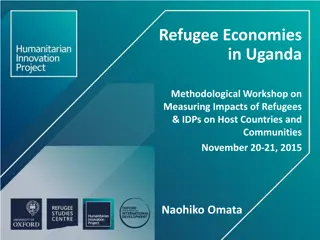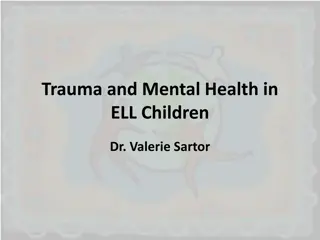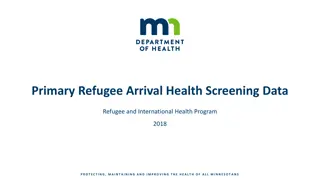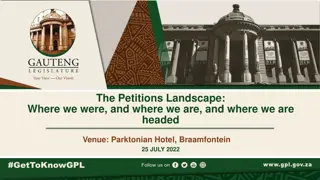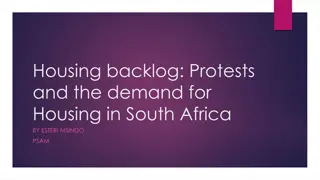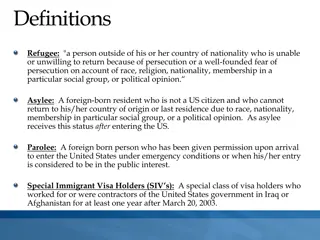Refugee Appeals Authority of South Africa (RAASA) Appeals Backlog Presentation
The Refugee Appeals Authority of South Africa (RAASA) presented progress on appeals backlog to the Portfolio Committee on Home Affairs in March 2023. RAASA, an independent statutory body, hears and determines appeals against decisions of Refugee Status Determination Officers. The presentation outlined the project background, scope, progress report, digitization efforts, adjudication strategy, statistics, interventions, and recommendations to reduce backlogs.
Download Presentation

Please find below an Image/Link to download the presentation.
The content on the website is provided AS IS for your information and personal use only. It may not be sold, licensed, or shared on other websites without obtaining consent from the author.If you encounter any issues during the download, it is possible that the publisher has removed the file from their server.
You are allowed to download the files provided on this website for personal or commercial use, subject to the condition that they are used lawfully. All files are the property of their respective owners.
The content on the website is provided AS IS for your information and personal use only. It may not be sold, licensed, or shared on other websites without obtaining consent from the author.
E N D
Presentation Transcript
Refugee Appeals Authority of South Africa (RAASA) APPEALS BACKLOG PRESENTATION TO THE PORTFOLIO COMMITTEE ON HOME AFFAIRS, 14 MARCH 2023 1
PURPOSE OF THE PRESENTATION To present to the Portfolio Committee on Home Affairs progress on appeals backlog. 2
PRESENTATION OUTLINE Purpose of the presentation Presentation outline Introduction Backlog Project background Project Scope Project progress report Digitisation of files Capacitation Adjudication strategy Backlog statistics to date Additional interventions to reduce backlogs Recommendation 3
INTRODUCTION The Refugee Appeals Authority of South Africa (RAASA) is an independent statutory body established in terms of section 8(A)(1) of the Refugees Act (No 130 of 1998 as amended). The primary mandate of RAASA is to consider all the appeals made against the decisions of the Refugee Status Determination Officers (RSDO). Upon receipt of an application by an asylum seeker and conclusion of the hearing by the RSDO, the RSDO must either: grant asylum, reject the application as manifestly unfounded, abusive or fraudulent or unfounded. Manifestly unfounded and abusive or fraudulent claims are reviewed by the Standing Committee on Refugee Affairs (SCRA) Unfounded claims are appealed at RAASA 4
INTRODUCTION (2) The Appeals Authority functions as a quasi-judicial entity. It is within RAASA s mandate to: To hear and determine any appeals lodged in terms of the Refugees Act. To determine its own practice and make its own rules. Rules in this regard must be published in the Gazette. RAASA s appeal adjudication process is based on the fundamental legal principle known as the audi alteram partem rule that is, to listen to the other side. This requirement forms the basis of two requirements of natural justice: procedural fairness and the rule against being heard before an independent and uninterested adjudicator. A legally qualified Member of RAASA sits as an adjudicator / decision maker over an appeal. 5
INTRODUCTION (3) The hearing of these appeal cases entail the following: RAASA issues a Notice of Hearing with a set down date to the Appellant and the Appellant must then acknowledge receipt of the notice. This Notice of Hearing is sent to the last known address (including email address) of the Appellant. The Appellant is notified of his/her right to legal representation and to an interpreter. RAASA does provide interpretation services through the DHA. Prior to the hearing, the Appellant is given an opportunity to submit further evidence and Heads of Argument to RAASA. On the date of hearing, RAASA conducts a procedurally fair hearing and may also invite a representative of the UNHCR to sit in the appeal hearing. 6
INTRODUCTION (4) It is against this background that RAASA previously presented to the Committee its challenges in successfully serving these Notices of Hearing on Appellants and how this affects the adjudication process and finalisation of the appeal cases. However, RAASA together with the DHA has successfully employed a working strategy to get the Appellants to acknowledge these Notices. The DHA through its Section 22 permit renewal mechanism, is able to block an asylum seeker from renewing the permit on its system. The system will then notify the Appellant to report to RAASA before the system can generate a renewed Section 22 permit. RAASA is now receiving a significant number of Appellants coming through to acknowledge service across all its (5) regions. 7
INTRODUCTION (5) RAASA has now successfully updated the Appellants contact details and served them with Notices of Hearing in person and have them acknowledge receipt as per court s standards. This milestone will enable RAASA to proceed to finalise appeal cases even in the event that the Appellant does not attend hearing as scheduled. For the first time since the implementation of the Project, Members are now hearing about 3-4 appeal cases per day. In the event that the Appellant fails to honour his/her appearance before RAASA, a Member may proceed to determine the appeal on paper. 8
INTRODUCTION (6) The year 2009 signifies the highest peak of influx of asylum seekers into South Africa. This influx was due to the 2008 economic meltdown which many countries experienced. South Africa also experienced a recession, but in our region Zimbabwe was the hardest hit with a near economic collapse. For the first time, South Africa received asylum seekers in such numbers that the system could not keep up with the demand. Similarly, the Refugee Appeal Board (RAB), as it then was, was subjected to unprecedented numbers of failed asylum seekers emanating from RSDO decisions which led to the backlog. The following are two main contributors of the backlog: The then Refugees Act ( the quorum constitution requirement of the RAB), which led to the Western Cape High Court decision of Harerimana v Chairperson of the Refugee Appeal Board and Others. The high inflow of economic migrants. 9
INTRODUCTION (7) This backlog is not as a result of capacity constraints and incompetence of RAASA contrary to the popular saying. Every failed asylum seeker appeal their rejection outcome because the system allow. Currently, there is no legislation dealing with economic migrants and as such their significant numbers create a further bottle neck for appeals adjudication. The legislature created an unending bureaucratic ladder of appeal / review processes which are highly abused by failed asylum seekers and their legal representatives. Further, the International Treaties and Conventions on asylum seekers and refugees does not have legislation to deal with economic migrants either. In the absence of a Legislative Framework for economic migrants, they are similarly dealt with under the Refugees Act creating a further bottleneck. 10
BACKLOG PROJECT BACKGROUND A multi-year partnership agreement between United Nations High Commissioner for Refugees (UNHCR), the Department of Home Affairs (DHA) and the Refugee Appeals Authority of South Africa (RAASA) was signed on 8 March 2021. The signing of the partnership agreement paved way for the implementation of Plan 2019. Plan 2019 stands as the ultimate roadmap to guide the implementation of the Backlog Project and conceptualizes the adjudication strategy of the appeals. 8 March 2023, remains significant for the Backlog Project as it marks two years since the implementation of Plan 2019. Given its primary mandate of considering all the appeals made against the decisions of the Refugee Status Determination Officers (RSDO), RAASA continues to do so diligently in the midst of considerable hurdles along the way. 11
BACKLOG PROJECT BACKGROUND (2) The RAASA recruited 26 legally qualified Members at the inception of the Backlog Project. In terms of the Project Plan, a 36 Member component was envisaged. However, the recruitment of the remaining 10 Members remains stagnant due to UNHCR s budget constraints. The appointed RAASA Members were trained throughout 2021 in batches as they were not appointed simultaneously. The Project did not get underway until April 2021 due to delays, largely caused by the Covid-19 pandemic. The Authority conducted its very first hearing in December 2021. 12
BACKLOG PROJECT BACKGROUND (3) In view of the rising number of appeals against RSDO decisions which are the current appeal backlog at RAASA, this agreement of cooperation is aimed at eradicating the backlog of appeal cases and to prevent similar backlogs from recurring through the provision of capacity support to RAASA. The total cost of the 4-year implementation plan with 36 Members is R146, 784,364 million. 13
PROJECT SCOPE The first six-month phase This phase was intended as a preparatory phase to lay the groundwork and included, inter alia, the recruitment and training of Members, developing Standard Operating Procedures (SOP s) for all processes including digitization and streaming of files into different case processing modalities. The second six-month phase This phase was to see the active commencement of auditing and digitalization of files (by staff members in the Refugee Reception Offices) as well as streaming of these cases to enable Members to start with the adjudication of the appeals. 14
PROJECT SCOPE (2) According to the National Immigration Information System (NIIS) as at the implementation of the Plan, the pending appeal cases before RAASA were at 153 000. Through a mechanism that was put in place to determine which of the finalized cases were still part of the Backlog Project as well as inactive cases, the number decreased. A total of 19 418 appeal cases was subtracted from the initial Backlog of 153 000. The Project Scope was then ring-fenced on the remaining pending active appeals which amounted to 133 582. The caseload of 133 582 constitutes the total number of all appeal cases forming the backlog. 15
PROJECT PROGRESS REPORT RAASA presented to the Portfolio Committee on Home Affairs on 20 September 2022. Amongst other issues put before the Committee were challenges RAASA faced which delayed the smooth running of the Project. RAASA has in this 5-months period successfully eradicated some of these challenges and it is continuing to do so. The Project report is outlined below including few of the remaining hurdles. 16
PROJECT PROGRESS REPORT (2) Digitalization of files RAASA has previously reported that 11 818 files were digitalized for the Backlog Project. Currently, the number of digitalized files is standing at 17 841 across all the regions. The UNHCR has in line with the Project Partnership Agreement in January 2023, donated two scanning machines for digitalization. This will increase the volume of scanned files. 17
PROJECT PROGRESS REPORT (3) Digitalization of files As of 2021, RAASA began allocating digitalized files to Members for streaming appropriate adjudication approach towards the finalization of each case. To date more than 6000 cases have been allocated to Members for review. and recommendation of At this stage statistical reports include weekly dashboards to track productivity. The volumes of the finalized decisions are coming from the members in all different regions. 18
PROJECT PROGRESS REPORT (4) Statistics of digitalized appeal files to date: Durban Pretoria Cape Gqeber ha Musina TOTAL Town Digitalized Files 3242 7010 1435 1537 4716 17940 19
PROJECT PROGRESS REPORT (5) Capacitation of RAASA There has been a successful recruitment for RAASA at its Head Office as the daily operations were without sufficient admin support. Pending recruitment processes include that of the appointment of a Project Manager who will coordinate the Backlog Project, appointment of four Refugee Appeal Officers or Case Workers to assist the Members administratively in other regions. All these positions have been advertised and the process to fill them has started. RAASA also intends to recruit (5) legal secretaries to support Members to speed up writing decisions. 20
PROJECT PROGRESS REPORT (6) Capacitation of RAASA RAASA has received 12 interns from Safety and Security Sector Education and Training Authority (SASSETA) in all its 5 regions, to assist the Project with its day-to-day administrative work. As stated in the introductory part, the complete Project component of Members must be 36. However, RAASA is only operating with only 21 Members out the recruited 26 Members. 1 Member is deceased, 2 are incapacitated, 1 has resigned and 1 is on a part-time contract. 21
PROJECT PROGRESS REPORT (7) Adjudication Strategy As more appeal files are being digitalized, RAASA has adopted the following adjudication strategies which will assist in decreasing the backlog: Prioritizing of appeals by nationals emanating from refugee non- producing countries decommissioned by the UNHCR. Introduced performance based targets to improve performance and accountability. It is also within the mandate of RAASA to make paper determinations as an adjudication strategy instead of in person-hearings in certain circumstances. 22
BACKLOG STATISTICS TO DATE RAASA s Statistical Reports include weekly dashboards to track productivity. The following tables provide statistical information in relation to: The current backlog cases. Cases streamed, hearings conducted by Members. Statistical information on cancelled and withdrawn appeals. scheduled, hearings 23
PROJECT STATISTICS TO DATE (2) The table below provides a summary of statistical information in relation to the number of current backlog cases. Cape Town Durban Musina Gqeberha Desmond Tutu Grand Total Current Files 2176 4223 5512 153 1231 13295 Heritage Files 16502 10197 2379 2693 34532 66303 Mid-Range Files 7156 12645 3650 32 30501 53984 Grand Total 25834 27065 11541 2878 66264 133582 24
PROJECT STATISTICS TO DATE (3) The table below provides a summary of statistical information in relation to the number of cases streamlined by Members, hearings scheduled as well as the number of hearings conducted to date. DESCRIPTION HQ Cases allocated for review 1347 DT CT DBN PE MU TOTAL 2321 454 580 339 1700 6741 4646 268 189 Hearings scheduled 1115 1371 354 409 118 1279 Notices for paper determinations 114 83 0 6 26 39 Notices for No show - paper determinations 84 93 5 2 4 1 DESCRIPTION Reviewed & profiled HQ DT CT DBN PE MU TOTAL 1435 1595 402 413 186 1710 5741 1285 810 183 17 186 Hearings conducted 333 246 134 264 42 266 261 158 55 142 32 162 Heard appeals decision finalized 76 89 0 1 15 2 Paper determinations finalised 9 6 0 0 2 0 No Show decisions finalised 180 1 1 0 3 1 Section 3 C decisions on paper Total number of finalised decisions Cancellations / Withdrawals 1196 3545 4741 Grand Total 25
BACKLOG STATISTICS TO DATE (4) The table below provides a summary of statistical information in relation to the number of appeal cases that were cancelled or withdrawn: COUNTRY PAKISTAN UGANDA DRC ERITREA ETHIOPIA RWANDA SOMALIA INDIA NIGERIA BURUNDI BANGLADESH IVORY COST GHANA PALESTINE SENEGAL ZIMBABWE CAMEROON GUINEA KENYA BENIN EGYPT COMOROS NEPAL TURKEY TOTAL CANCELLED APPEALS 70 5 402 17 1920 7 27 34 17 113 865 1 15 1 7 19 11 1 2 1 1 1 5 2 3545 26
ADDITIONAL INTERVENTIONS TO REDUCE THE BACKLOG As alluded above, purpose of the Backlog Project is to finalize the backlog inventory and put measures in place to prevent similar backlogs from occurring in the future. It is also in keeping with the Department of Home Affairs mandate to manage international migration efficiently and securely in the social, economic and cultural interests of all citizens and to manage asylum seekers who apply for refugee status; and to persons who have been granted status in accordance with the Refugees Act. 27
ADDITIONAL INTERVENTIONS TO REDUCE THE BACKLOG (2) These plans include: o Group decisions: The RAASA may make a ruling in terms of its Practice Note that would allow for two or more appeals to be determined together. This would be the position where; A similar question of law or fact arises. Asylum seekers are members of the same family. It is practical and efficient to proceed with more than one appeal. 28
ADDITIONAL INTERVENTIONS TO REDUCE THE BACKLOG (3) o Adjudication of new appeals: Some Members will be assigned to deal with new incoming appeals to avoid recurring backlog once the Project Backlog has been finalised. When it comes to decision writing, e-files allow for writing efficiently in almost any location as long as a Member has a laptop to work from. A live online system is finalised and it is still being tested by DHA s IT Directorate, which will be able to track productivity of the adjudication process, automatically update statistics, and monitor overall performance across all regions. A Case Management System has been developed. 29
RECOMMENDATION It is recommended that the Portfolio Committee for Home Affairs notes the presentation on the RAASA Backlog Project. 30
THE END 31
